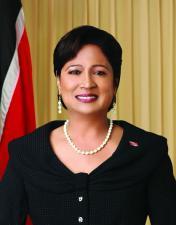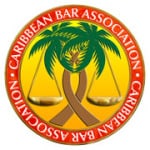Statement by Trinidad and Tobago PM, The Hon Kamla Persad Bissessar, on the Removal of Trinidad and Tobago from FATF list of countries with strategic AML/CFT deficiencies
PORT OF SPAIN, Trinidad – On Friday October 19, 2012 the Prime Minister of the Republic of Trinidad and Tobago, The Hon Kamla Persad Bissessar, MP, SC, issued the following statement on the Removal of Trinidad and Tobago from FATF list of countries with strategic AML/CFT deficiencies:
Mr Speaker,
It gives me great pleasure to make this statement in this Honourable House.
Over the past year, there have been reports in the public domain about the status of our anti-money laundering laws and well as the appointments made to the Financial Intelligence Unit (FIU).
There were reports; some of emanating from the Opposition that Trinidad and Tobago could face severe sanctions internationally for allegedly failing to deal with anti-money laundering legislation.
They painted a dark and gloomy picture and sullied our image by predicting that Trinidad and Tobago was on the verge of being blacklisted by FATF. (see web information on FATF at www.fatf-gafi.org)
We were told that our citizens will not be able to use their credit cards overseas, investor confidence will be adversely affected, our trading partners will look for new suppliers and markets, job losses will occur and Trinidad and Tobago will become a haven for money launderers and terrorists.
I am pleased to announce today, Friday October 19, 2012, that at the FATF Plenary in Paris, France, FATF has agreed that Trinidad and Tobago should be removed from the list of countries with strategic AML/CFT deficiencies.
Trinidad and Tobago has therefore exited the FATF process.
This means that we have been removed from the grey list.
It means that we are not going to be put on any blacklist.
It means that we are not going to be placed on any yellow, brown or green list!
It means that the only colours that will apply to Trinidad and Tobago will be the RED, WHITE and BLACK!
Permit me to recite a brief chronology of the relevant developments in this matter.
In February 2010, Trinidad and Tobago was publicly identified as a country with strategic Anti-Money Laundering/Combating Financing of Terrorism (AML/CFT) deficiencies in the Financial Action Task Force (FATF) Public Statement entitled “Improving Global AML/CFT Compliance: On-going Process”.
This public identification was as a result of a Mutual Evaluation wherein Trinidad and Tobago was rated as partially compliant or non-compliant with fifteen (15) of the sixteen (16) key and core recommendations of the FATF.
When this Government assumed office in May 2010, the complexity of this matter was brought to my government’s attention.
What we inherited was embarrassing. The FIU was not operational and had no staff.
An Attorney from private practice who was a private consultant to the Office of the AG had been appointed to “act” as the interim director.
When we speak of conflict of interest that is something we have to look at.
There was little or no staff and the legislative framework was defective.
Trinidad and Tobago at that juncture stood on the brink of being “blacklisted” by the FATF.
Mr. Speaker that is what we inherited at that time.
As Prime Minister, I made a high level political commitment to the Financial Action Task Force and the Caribbean Financial Action Task Force ensuring Trinidad and Tobago will continue working assiduously in addressing our identified AML/CFT deficiencies.
I made that commitment immediately on it being brought to my attention as the new government and we are committed as a nation to addressing those diffencies.
One only has to look at the effect on Bahamas, Cayman Islands, Saint Kitts and Nevis and Saint Vincent and the Grenadines by appearing on the list of uncooperative countries in regard to the fight against money laundering published by FATF in the year 2000 to see the devastating economic and reputational consequences experienced.
That was a risk my government was not willing to take.
That was a gamble that the People’s Partnership Government would not take with the economic and reputational viability of this country.
As a responsible Government we did not panic the population as to the deleterious effects of non-compliance with the FATF recommendations for fear of undermining investor confidence. Upon mature consideration, we chose instead to take deliberate steps to ensure that immediate action was taken to remedy these deficiencies.
Accordingly, I mandated that the Honourable Minister of National Security, immediately devote all necessary resources to ensure that the strategic deficiencies identified by FATF were addressed expeditiously to avoid being elevated to the FATF Public Statement or “blacklist” and circumvent sanctions being imposed on Trinidad and Tobago by the international community.
I immediately appointed a National AML/CFT Committee comprising several senior cabinet Ministers and high-level technocrats.
This committee was duly constituted by November 2010. It included the Hon Minister of National Security, the Hon Attorney General and the Hon Minister of Finance.
It also included the Director of the AML/CFT Compliance Unit, Mrs. Sherene Murray-Bailey, and the Head of the FIU Ms Susan Francois.
This committee co-opted the heads of departments with responsibility for various aspects of our national AML/CFT architecture.
This Committee continues to guide Government’s policy in respect of compliance with our international obligations and is a vital cog in our national AML/CFT regime and continues to strengthen our AML/CFT compliance.
A comprehensive review of the AML/CFT legislation was undertaken by the Ministry of National Security, the Office of the Attorney General and the Ministry of Finance.
Mr. Speaker you may well recall amendments to the legislation.
Amendments to legislation were guided by the policies and recommendations formulated by the reconstituted National Cabinet Appointed AML/CFT Committee and through stakeholder consultation.
The amended pieces of legislation are:-
• The Financial Intelligence Unit of Trinidad and Tobago (Amendment) Act 2011;
• The Anti-Terrorism (Amendment) Act 2011;
• Trafficking in Persons Act, 2011;
• The Financial Obligation (Financing of Terrorism) Regulations, 2011;
• The Financial Intelligence Unit of Trinidad and Tobago Regulations, 2011; and
• The Miscellaneous Provisions (Financial Intelligence Unit of Trinidad and Tobago and Anti-Terrorism) Act, 2012.
Five pieces of essential legislation in 2011 and the sixth piece in 2012.
In February 2011, I, along with members of my Cabinet, met with a Caribbean Financial Action Task Force (CFATF) high level Mission to discuss Trinidad and Tobago’s progress in rectifying its AML/CFT strategic deficiencies.
Emanating from those discussions, I reinforced the Government’s unwavering commitment to achieve further compliance with the international financial standards set by FATF.
Trinidad and Tobago will recall that in June 2012, the FATF agreed that Trinidad and Tobago had made significant progress in rectifying its AML/CFT deficiencies such that an onsite visit was warranted to ensure that the progress reported by technocrats at the FATF Plenaries had in fact been made and were sustainable.
The FATF conducted a comprehensive onsite review in Trinidad during the period August 28-29, 2012.
At this time, the FATF onsite team met with senior public and private stakeholders with responsibility for implementing the AML/CFT regime.
Members of Cabinet met with the onsite team and re-iterated our commitment to addressing financial crime in all its facets.
A delegation of senior Government technocrats consisting of the Director of Public Prosecutions, the Commissioner of Police, the Inspector of Financial Institutions, the Comptroller of Customs and Excise, the Director of the AML/CFT Compliance Unit as well as the Director of the Financial Intelligence Unit (FIU) also met with the onsite team.
Private sector representation during the onsite visit included the Bankers Association of Trinidad and Tobago, the Association of Trinidad and Tobago Insurance Companies and listed businesses regulated by the FIU.
We want to thank all those from private and public sector who participated.
I therefore take great pride in informing the nation that FATF has recognised that significant progress has been made in rectifying our AML/CFT deficiencies.
At the FATF Plenary in Paris, France, it agreed to remove Trinidad and Tobago from the list of countries with strategic AML/CFT deficiencies.
Again I refer to the website – this is right now online! A public statement issued today:
Paris, 19 October 2012 – Under the Norwegian Presidency, the first FATF Plenary meeting of FATF-XXIV was held in Paris on 17-19 October 2012.
AML/CFT Improvements in Trinidad and Tobago
The FATF welcomes Trinidad and Tobago’s significant progress in improving its AML/CFT regime and notes that Trinidad and Tobago has established the legal and regulatory framework to meet its commitments in its Action Plan regarding the strategic deficiencies that the FATF had identified in February 2010.
Trinidad and Tobago is therefore no longer subject to FATF’s monitoring process under its on-going global AML/CFT compliance process.
Trinidad and Tobago will work with CFATF as it continues to address the full range of AML/CFT issues identified in its Mutual Evaluation Report, particularly implementation of the new legislative and regulatory reform in order to more effectively combat illicit finance in Trinidad and Tobago.
http://www.fatf-gafi.org/countries/s-t/trinidadandtobago/documents/outcomesoftheplenarymeetingofthefatfparis17-19october2012.html
Trinidad and Tobago has therefore exited the FATF process.
We are not going to be ‘blacklisted’.
It means we are not going to be placed on any colour list. The only colours that will be attributed to Trinidad and Tobago is the red, white and black.
This mammoth achievement could not be accomplished alone, and I would like to extend my sincerest gratitude to the Hon Attorney General, the Hon Minister of National Security and the Hon Minister of Finance for their tireless efforts that led to this successful outcome.
In addition, my thanks also goes out to the Office of the Chief Parliamentary Counsel, the Office of the Director of Public Prosecutions, the Central Bank of Trinidad and Tobago, the Ministry of Finance in particular, the Financial Intelligence Unit and all other public and private stakeholders and institutions that have made worthwhile and invaluable contributions to this de-listing.
I also pay tribute to all the hard working public officers whose dedication to country and duty made this wonderful result a reality.
The success of the government in this matter is no small feat. There are several larger and more developed countries around the world that have been flagged as being deficient. They continue to be monitored by FATF.
This success confirms my government’s commitment to fight crime at any and all levels.
I will now quote from the report sent to the Minister of National Security from the Ms. Sherene Murray-Bailey, Director, Compliaince:
It is with great pride that I now inform you, Hon. Minister that FATF has recognized that significant progress has been made by Trinidad and Tobago in rectifying our AML/CFT deficiencies. In fact during the discussion on TT the Executive Director of CFATF proudly indicated that TT had proffered it first money laundering charge since the enactment of the legislation. TT was encouraged by the FATF to press on.
Earlier today, Friday October 19th 2012, the FATF Plenary agreed that TT should be removed from the list of countries with strategigic AML/CFT deficiencies.
TT has therefore has therefore exited the FATF process.
The passage of strong anti-money laundering legislation is equivalent to putting a high-powered rifle in the hands of our law enforcement agencies.
It places the financial sector under a duty to report suspicious transactions and equips the FIU and Financial Investigations Bureau with the right legal tools to fight white collar crime.
Our removal from the grey list of FATF is a significant milestone.
It confirms and demonstrates the strong commitment of my government to tackle financial fraud, corruption and white collar-crimes in all forms.
The magnitude of our accomplishment as a nation is highlighted in a letter issued today to the Hon Minister of National Security from the Executive Director of the CFATF organisation which has jurisdiction over the Caribbean.
This letter date Oct 19th 2012 is full of praise for the efforts of the government and asks now, for OUR help in assisting other countries to become compliant.
Permit me to quote from that letter:
Port of Spain,
Friday 19th October 2012
The Honourable Jack Warner
Minister
Ministry of National Security
Government of Trinidad and Tobago
31 – 33 Abercomby Street,
Port of Spain.
Dear Honourable Minister,
On behalf of Chairman Manuel Gonzalez, all Members of the Caribbean Financial Action Task Force (CFATF) and the staff at the Secretariat, I would like to extend warmest congratulations to you and the Government and people of Trinidad and Tobago on the removal of Trinidad and Tobago from the monitoring process of the Financial Action Task Force (FATF) International Co-operation Review Group (ICRG) Initiative.
This sterling achievement must be commended as a testimony of the commitment at the highest political levels in Trinidad and Tobago, to ensure that the Anti Money Laundering and Combating the Financing of Terrorism architecture is strong and is being effectively implemented in keeping with international best practices.
I trust that Trinidad and Tobago will continue to work with both the FATF and the CFATF with a view to rectifying all outstanding deficiencies in its Mutual Evaluation Report as expeditiously as possible so that it can be well placed to be assessed under the Fourth Round of the CFATF Mutual Evaluation Programme.
Trinidad and Tobago has amassed considerable experience and expertise during its involvement with the FATF ICRG process and I would like to take this opportunity to enlist your support in putting this wealth of talent to the benefit of ten CFATF Members that have met the FATF ICRG criteria in particular and to the CFATF generally by assuming the Chair of the CFATF ICRG when the current Chair demits office at the November 2012 Plenary Meeting.
Trinidad and Tobago has a significant and constructive role to play within the CFATF family and I would be pleased to meet with you at our earliest mutual convenience to discuss this prospect and well as some other matters related to the general operations of the Secretariat and the organization as a whole.
Once again my congratulations to you as Prime Contact to the CFATF on the important milestone of having successfully navigated the FATF ICRG process.
Yours sincerely,
Calvin E. J. Wilson
Executive Director
Mr Speaker I wish to reiterate, this Government is ever cognisant of the ill effects of money laundering and terrorist financing and will continue to expend all possible resources in this area in recognition of the deleterious effect it can have on our country’s financial stability and national security.
As Prime Minister, I am committed to ensuring that our AML/CFT regime is effectively implemented to advance Trinidad and Tobago closer toward full compliance with the FATF recommendations.
The laws have been strengthened, and it is now up to us to enforce them.
There are too many reports of money-laundering. Suspicious bank accounts are being monitored and reported by the banks.
The Financial Intelligence Unit (FIU) has its work cut out for them. It is time for action, and those who are involved in money-laundering, must know that they can run, but they cannot hide.
I thank you, Mr Speaker.

PM The Hon Kamla Persad Bissessar




